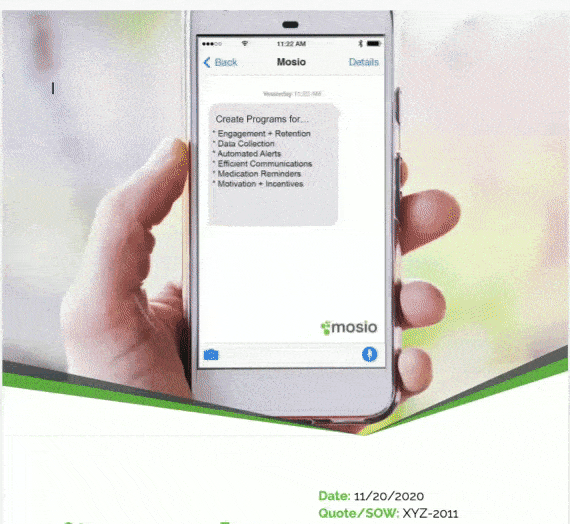Clinical trial data management systems are helping teams in three main areas:
- Centralizing data collection and management.
- Improving patient engagement and retention.
- Automate reminders and notifications for study activities.
When we talk with study coordinators, they are often eager to try new systems for managing trial data. They are tired of using mediocre platforms which fail to make data management easier.
Study coordinators already have plenty on their plates. The last thing they need is unreliable systems or ones that come with large learning curves. From our conversations from those running clinical trials, teams want plug-and-play solutions with the potential to drive patient engagement and retention.
What Is A Clinical Trial Data Management System?
In short, a clinical trial data management system brings all trial data under one roof for your team. These types of systems support various aspects of trial management, such as patient recruitment, data collection, data storage, monitoring, and reporting.
What Difference Can A Good Clinical Trial Data Management Make?
When you streamline workflows, ensure data integrity, and improve collaboration among research teams, clinical trial data management systems play a crucial role in meeting regulatory requirements and achieving study objectives. Let’s break down the key reasons why clinical trial data management matters in more detail:
1 – Data Quality
A robust data management system helps maintain the integrity of the data collected throughout the trial – which can help minimize errors and potential inconsistencies. High-quality data is vital for drawing accurate conclusions and making informed decisions using clinical study results.
2 – Regulatory Compliance
A well-managed data system ensures adherence to regulatory requirements, including data privacy and security standards. Non-compliance can result in costly fines, delays, or even the termination of a study.
3 – Analysis & Decision-Making
Efficient data management allows for timely data analysis – which can help lead to informed decision-making and better study outcomes. Team members can begin to identify trends and patterns in the data – which can potentially help guide future research.
4 – Reducing Costs & Time
Streamlined data management processes can save both time and resources, contributing to overall cost reduction. When you automate repetitive tasks and minimize manual data entry, it enables clinical staff to allocate more time to focus on high-value tasks that are suited to their unique skill sets.
Clinical Trial Data Management Software: Here’s 5 Things We Look For
Clinical trial data management software should include the following core elements:
1 – In-Built Data Collection Tools
The software should come with data collection tools and offer various data collection methods, including electronic patient-reported outcomes (ePRO) and surveys. These options enable researchers to pick the most appropriate data collection methods for their trials.
2 – Data Storage & Security
The software solutions should securely store data and offer some role-based access controls. This can help ensure compliance with data protection regulations. To safeguard against any data loss, the software should also provide backup and recovery options.
3 – Data Cleaning & Validation
When it comes to maintaining data quality, the software should provide tools for data validation, error detection, and data cleaning. These features help identify and correct inconsistencies – and ensure data remains accurate and reliable.
4 – Reporting & Analytics
The software solutions should generate useful reports and come with some in-built analytics tools to help researchers make informed decisions based on the collected data. Customizable reporting options allow researchers to visualize and analyze the data in ways that are suited to their specific needs.
5 – Integration Capabilities
The best software solutions will neatly integrate with the rest of your technology stack. For instance, they should connect with electronic data capture (EDC) systems and electronic health records (EHR) to enable seamless data flow and reduce the need for manual data entry.
5 Key Benefits Of Using Automated Text Messaging
Using a solution like Mosio for automated text messaging presents many benefits to those managing clinical trials:
1 – Improved Communication
Text messaging allows for instant communication between research teams and participants – which can help ensure that important information is relayed promptly and efficiently. This real-time communication enhances the overall study experience for participants and research teams alike, giving participants all the information they need to stay well informed.
2 – Enhanced Participant Engagement
Automated reminders and notifications can help participants stay on track with study activities and appointments, increasing engagement and retention rates. This improvement is especially important in lengthy studies, where participant engagement can significantly impact the study outcomes.
3 – Reduced Time Burden
Automating tasks, such as appointment reminders and medication adherence alerts, frees up staff time, allowing them to focus on other time-sensitive aspects of the study. This efficiency can lead to trial staff pouring their attention into pivotal tasks that deserve their attention.
4 – Increased Data Collection Efficiency
Text message surveys and ePRO tools can streamline data collection processes. With greater convenience for both participants and researchers, simplifying data collection is a win-win for all parties. Researchers can ensure that they obtain high-quality, timely data to support their study objectives while participants can avoid falling behind with the completion of surveys.
5 – Integration With Existing Systems
Mosio’s text messaging solution can integrate with popular data management tools like REDCap – which allows for seamless data flow between systems. This integration minimizes the need for manual data transfer, reducing the risk of human error and enhancing overall efficiency.
Retain & Engage Study Participants With Mosio
Incorporating text messaging into clinical trial management can also improve retention and engagement rates. Retaining and engaging study participants is important for the success of any clinical trial as high dropout rates can impact the validity of your study findings.
The automated text messaging platform offered by Mosio can reduce the amount of work needed to engage and retain participants in your clinical trials, leading to more reliable data sets and trials that are generally easier to coordinate.


![Clinical Trial Data Management System: Here’s What Teams Use [August 2025]](https://www.mosio.com/wp-content/uploads/2023/04/national-cancer-institute-NFvdKIhxYlU-unsplash-scaled.jpg)




